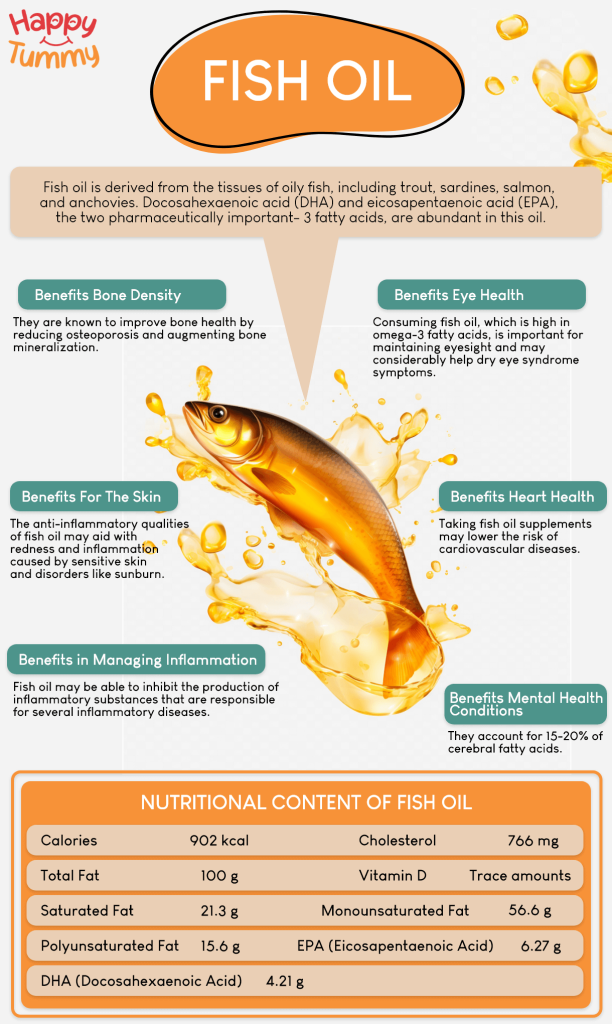Table of Contents
Due to recent technological advancements, life has become more rapid and comfortable, but it has also brought several health risks. Lifestyle diseases are primarily due to poor eating habits, such as overindulging in certain meals, rich in saturated fat, and nutritional deficiencies.
Poor eating habits are making nutritional deficiencies more common. However, over the past decade, dietary supplements such as Omega-3 Fatty Acids have become more popular among people concerned about their health since they may encourage and sustain an active lifestyle.
A nutritional supplement should be taken only when a deficiency is present and the doctor has prescribed it. It should strictly not be taken without medical supervision and label instructions to avoid any negative implications.
Fish oil is one such dietary supplement consumed under doctors’ or healthcare professionals’ Guidance. Fatty fish, such as trout, sardines, salmon, and anchovies, are the source of fish oil.
Omega-3 fatty acids, which promote excellent health benefits, are abundant in fish oil supplements.
Continue reading to learn about the potential advantages of fish oil.
What is Fish Oil?
Fish oil is derived from the tissues of oily fish, including trout, sardines, salmon, and anchovies. Docosahexaenoic acid (DHA) and eicosapentaenoic acid (EPA), the two pharmaceutically important ω – 3 fatty acids, are abundant in this oil.
Omega-3s are a type of polyunsaturated fats that are essential to our diet.
Polyunsaturated fats have a potential role to play in managing cholesterol levels in the blood, reducing the risk of heart disease and stroke. The internal organs such as the brain and retina also depend on omega-3 fatty acids, for their optimum functioning.
Omega-3s have several benefits, such as: [1]
- Supporting the development of new tissues and cells
- Providing energy to your body
- Helps with managing inflammation in the body
Since your body cannot produce omega-3s, you must get them from diet (or supplements if you don’t eat fish or other seafood or plant sources).
Nutritional Content of Fish Oil
Fish oil is extracted from oily fish like herring, tuna, anchovies, and mackerel. It has omega-3 fatty acids, which are suitable for your health. Together with vitamins A and D, omega-3s are a significant component of fish oil.
Omega-3s from fish oil are more beneficial to health than those from plants.
Alpha-linolenic acid (ALA) is the primary omega-3 fatty acid found in plant sources, whereas eicosapentaenoic acid (EPA) and docosahexaenoic acid (DHA) are the two primary forms found in fish oil.[2]
The nutrient profile of fish oil is as follows [3]
| Nutrient | Per 100 g |
| Calories | 902 kcal |
| Total Fat | 100 g |
| • Saturated Fat | 21.3 g |
| • Monounsaturated Fat | 56.6 g |
| • Polyunsaturated Fat | 15.6 g |
| • Omega-3 Fatty Acids | |
| • EPA (Eicosapentaenoic Acid) | 6.27 g |
| • DHA (Docosahexaenoic Acid) | 4.21 g |
| Cholesterol | 766 mg |
| Vitamin D | Trace amounts |
| Vitamin A | Varies |
[A1]
Health Benefits of Fish Oil

#1 Benefits Bone Density
Your body would be a mushy lump on the ground if it weren’t for strong bones. Also, muscle strength will work together with bones to move your body around. In addition, it shields you from harm and protects your organs.
Fish oil contains omega-3 fatty acids, which helps support bone density.
According to studies, higher blood levels of omega-3 fatty acids may be associated with improved bone mineral density. Omega-3 fatty acids may also help elderly persons maintain bone mineral density in their spines.[4]
So when it comes to fish oil, the omega-3 fatty acids in it may benefit your bone density and keep you stronger and healthier.
#2 Benefits Mental Health Conditions
The brain is exceptionally rich in polyunsaturated fatty acids, including omega‐3 fatty acid. They account for 15–20% of cerebral fatty acids , including omega-3. Omega-3 fatty acids are, therefore, extremely necessary for normal brain function. [5]
Furthermore, omega-3 fatty acids may have a potential role in improving mental health by acting as anti-inflammatory agents in the brain, which may influence the neurotransmitters and the activity of brain cells.
DHA also has a biological role in supporting the normal development of the brain, eyes and nerves.
Omega-3 PUFAs are known to have membrane-enhancing capabilities in brain cells, which are beneficial in repairing brain damage by promoting neuronal growth.
Numerous studies have demonstrated that those who consume more omega-3 fatty acids from fish oil or oily fish may be less likely to experience depression.[6]
#3 Benefits Eye Health
Consuming fish oil, which is high in omega-3 fatty acids, is important for maintaining eyesight and may considerably help dry eye syndrome symptoms.
Omega-3 hydrates the eye to prevent drying of the eye surface. As a result, it could benefit eye health by reducing eyelid irritation and inflammation. .[7]
According to research, people who don’t receive enough omega-3 fatty acids are more likely to develop eye disorders. Furthermore, eye health begins to decline in old age, which can lead to age-related macular degeneration (AMD).
The positive impacts are ascribed to the anti-inflammatory properties of omega-3 polyunsaturated fatty acids, specifically docosahexaenoic acid (DHA) and eicosapentaenoic acid (EPA), which are present in fish oils.[8]
#4 Benefits in Managing Inflammation
Omega-3 fatty acids included in fish oil may be able to manage the production of inflammatory substances from white blood cells. They could create the building blocks that control inflammation in your joints and your immune system.
Omega-3 fatty acids disrupt the body’s inflammatory response by interfering with cytokine enzymes and leukocytes, two immunological cells. The marine omega-3 fatty acids may inhibit inflammation from starting.
Thus, fish oil may aid in managing chronic inflammatory diseases due to its anti-inflammatory qualities.[9]
#5 Benefits For The Skin
Your skin is the largest organ in your body, containing many omega-3 fatty acids.
Omega-3 fatty acids, abundant in fish oil, may support healthy skin. It could enhance how your skin’s barrier works, which keeps moisture in and hazardous substances out.[10]
Additionally, the anti-inflammatory qualities of fish oil may aid with redness and inflammation caused by sensitive skin and disorders like sunburn. It could help in stimulating collagen syntheis, the elastic base of your skin.[11]
Studies have also shown that dietary supplementation with omega-3 PUFAs provides photoprotection by being effective against UV-irradiation-induced damage
#6 Benefits Heart Health
Eicosapentaenoic acid (EPA) and docosahexaenoic acid (DHA), two unsaturated fatty acids prevalent in the body and found in parts like the heart and brain, are found in fish oil.[12]
Research shows that taking fish oil supplements may lower the risk of cardiovascular diseases. Omega-3 fatty acids are known to decrease platelet aggregation.
Besides these benefits, omega-3 fatty acid intake also changes blood lipid levels.
It was observed to reduce the serum triglyceride concentration by 30% with an associated increase in HDL (Good Cholesterol). This HDL increase may reduce the risk of heart disease. [13]
Omega-3 fatty acids, found in fish oil, may help keep your heart healthy by reducing triglycerides fat in your blood and slowing plaque buildup in your arteries. [14]
Who Should Avoid Fish Oil
Certain drugs or supplements may interact with fish oil supplements.
If you have chronic illnesses like diabetes, heart disease, kidney disease, liver disease, or any pancreatic ailment, or if you are on any medications, especially blood thinners, consult a healthcare professional before taking them.
Side Effects of Fish Oil
You could experience fish oil sensitivity. Excessive use of fish oil might also be detrimental.
Depending on the person’s underlying medical problems, drugs, and supplements, side effects might vary in frequency and intensity. The following are possible adverse effects of consuming fish oil:
- Loose Stools
- Nausea
- Fishy Belching
Depending on the person’s underlying medical problems, medications, and supplements, he or she may have side effects that vary in frequency and intensity.
Contact your healthcare professional to understand the frequency and quantity of consumption.
To avoid any negative implications, follow label instructions and medical supervision. Excess and/or unsupervised intake of nutritional supplements is not considered safe for overall health.
Make an appointment with our certified nutritionist to discuss lifestyle modifications to improve your health.
Wrap Up
Fish oil is a dietary supplement that may help safeguard eye health and manage inflammation, among other potential advantages.
Its omega-3 fatty acids make it a valuable addition to a balanced diet, helping to ensure overall well-being.
Before taking fish oil, talk to a healthcare provider about the risks based on your health history. Follow their guidance about the proper dosage and use, and inform them of any side effects you have.
However, making the right food choices that offer a balanced, healthful diet is crucial in this situation.
Frequently Asked Questions
Fish oil supplements are available in liquid, capsule, and pill form.
No, good quality fish oil supplements should not have a pungent taste.
Fish Oil is a supplement and not a regular cooking oil. It can only be taken with a doctor’s prescription and suggestion. Fish oil cannot be part of a balanced diet. It is taken only when there is a specific deficiency and a healthcare professional has asked you to consume it.
Fish oil is formulated for its high omega-3 fatty acid content, which is beneficial in regulated amounts. Unlike regular cooking oils, fish oil is not designed for culinary use and is not intended for consumption in large quantities.















